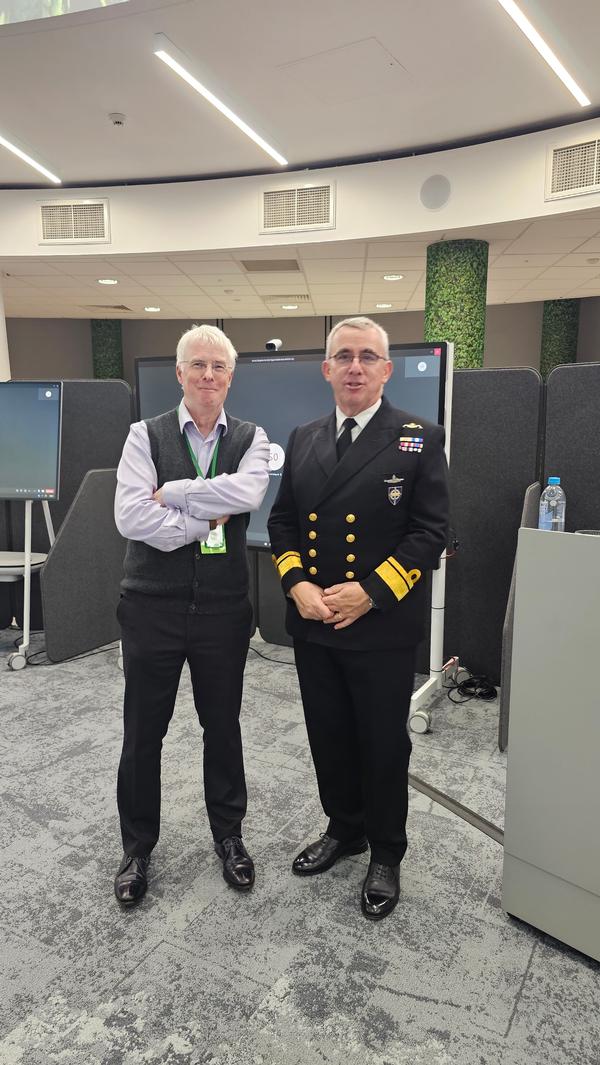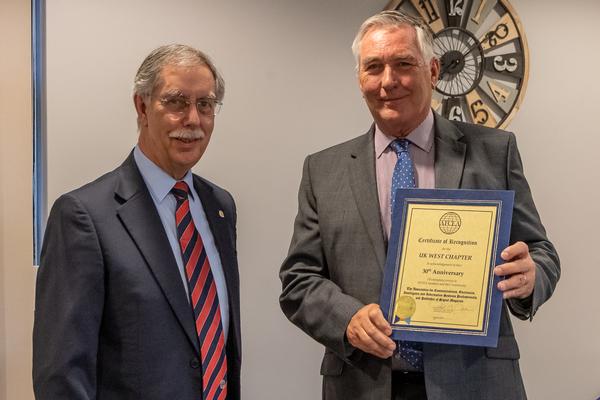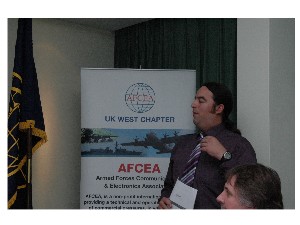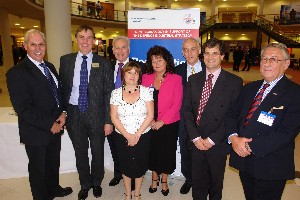 |
UK WEST CHAPTER - 09/10/2024 In September, the chapter's guest speaker, Rear Adm. Nick Wheeler, director of the NATO Digital Staff, discussed his staff's role in the NATO Headquarters, with particular reference to digital transformation and the critical element that a Digital Backbone will play in the future vision for how the alliance will fight, also known as multidomain operations.
In September, the chapter's guest speaker, Rear Adm. Nick Wheeler, director of the NATO Digital Staff, discussed his staff's role in the NATO Headquarters, with particular reference to digital transformation and the critical element that a Digital Backbone will play in the future vision for how the alliance will fight, also known as multidomain operations.The ultimate goal of the NATO Digital Backbone is one single and globally-accessible environment for information sharing, from the political realm through all three levels of command, and spanning across multiple participants, multiple operational domains and all the COIs within. The NATO Digital Backbone integrates various data sources and services, enabling large-scale data sharing and exploitation, thus transforming NATO into a data-centric alliance and enhancing military effectiveness and political decision-making. Adm. Wheeler provided the latest view on how the NATO Digital Backbone will be defined. What it is ... READ MORE |
UK WEST CHAPTER - 06/13/2019 At the June chapter meeting, three key events were recognized. Firstly, Chris Yorke, AFCEA regional vice president for Western Europe, presented the chapter with its Model Chapter 2019 banner and the 30th Anniversary Certificate of Recognition, which is a great tribute to both the members and chapter management team. Finally, and most importantly, it was time to say thank you-but not goodbye-to John Kirby, who was handing over as the chapter president after 12 years of service. Kirby has been an absolute stalwart in leading the chapter for all these years and in that time, he has only missed two meetings, which is quite an achievement. As any chapter president knows, Kirby has had his challenges in managing and maintaining momentum for what is only a small chapter, but he managed to find fantastic speakers from the technology base all around the west of England. Kirby now passes the baton over to Ian Buchanan, who has a tough act to follow but will be supported by the great team tha ... READ MORE
At the June chapter meeting, three key events were recognized. Firstly, Chris Yorke, AFCEA regional vice president for Western Europe, presented the chapter with its Model Chapter 2019 banner and the 30th Anniversary Certificate of Recognition, which is a great tribute to both the members and chapter management team. Finally, and most importantly, it was time to say thank you-but not goodbye-to John Kirby, who was handing over as the chapter president after 12 years of service. Kirby has been an absolute stalwart in leading the chapter for all these years and in that time, he has only missed two meetings, which is quite an achievement. As any chapter president knows, Kirby has had his challenges in managing and maintaining momentum for what is only a small chapter, but he managed to find fantastic speakers from the technology base all around the west of England. Kirby now passes the baton over to Ian Buchanan, who has a tough act to follow but will be supported by the great team tha ... READ MORE
|
|
UK WEST CHAPTER - 05/14/2009 |
|
UK WEST CHAPTER - 04/09/2009 |
|
UK WEST CHAPTER - 02/12/2009 |
|
UK WEST CHAPTER - 12/11/2008 |
|
UK WEST CHAPTER - 11/13/2008 |
|
UK WEST CHAPTER - 06/12/2008 Dr. Matthew Angling, QinetiQ, was the guest speaker at the June meeting. He discussed recent developments in ionospheric imaging and explained how comprehensive, global and timely specifications of the earth's atmosphere are required to ensure effective operation, planning and management of many radio frequency systems. After Dr. Angling's presentation, Col. John Kirby, British Army (Ret.), chapter president, announced the chapter had won a Model Chapter of the Year Award for its hard work and dedication. |
UK WEST CHAPTER - 04/17/2008 In April, Jon Dudley from QinetiQ's Maritime Division briefed the chapter on the U.K. Maritime Tactical Networks Command and Control (MTNC2) Capability Technology Demonstrator. This work has been developed under a U.K. Defence Ministry research program. Dudley served as the sea trials officer for the successful trials undertaken by QinetiQ in conjunction with the Royal Navy in 2004 and 2006. MTNC2 allows the Royal Navy to create a tactical wide area network at sea. He explained how the MTNC2 was able to automatically use whatever communications channels were available between the ships to communicate with each other, and how it was able to access the relevant satellite channels wherever they were within the fleet.
In April, Jon Dudley from QinetiQ's Maritime Division briefed the chapter on the U.K. Maritime Tactical Networks Command and Control (MTNC2) Capability Technology Demonstrator. This work has been developed under a U.K. Defence Ministry research program. Dudley served as the sea trials officer for the successful trials undertaken by QinetiQ in conjunction with the Royal Navy in 2004 and 2006. MTNC2 allows the Royal Navy to create a tactical wide area network at sea. He explained how the MTNC2 was able to automatically use whatever communications channels were available between the ships to communicate with each other, and how it was able to access the relevant satellite channels wherever they were within the fleet.
|
UK WEST CHAPTER - 04/20/2007 The second AFCEA TECHWEST Conference and Exhibition in April attracted some 270 delegates and 46 Exhibitors and a star-studded cast of speakers who discussed the UK Defence Industrial Strategy. Cdre. Robert Howell, RN (Ret.), general manager of AFCEA Europe, delivered the AFCEA International message before handing over to Lt. Gen. Sir Tony Pigott, KCB CBE MA, Defence and Security Adviser to QinetiQ. Pigott spoke on future military operations and how the defence industrial strategy is vital to ensuring military capabilities for the warfighter. Rear Admiral Neil Latham, Commandant of the Defence College of Management and Technology, spoke about the importance of new technology to the warfighter and the trends in technology development today and in the future. John Taylor, director for general information at the UK Ministry of Defence, highlighted the challenges faced in the increasingly complex world of networks and network connectivity, emphasizing the importance of getting the se ... READ MORE
The second AFCEA TECHWEST Conference and Exhibition in April attracted some 270 delegates and 46 Exhibitors and a star-studded cast of speakers who discussed the UK Defence Industrial Strategy. Cdre. Robert Howell, RN (Ret.), general manager of AFCEA Europe, delivered the AFCEA International message before handing over to Lt. Gen. Sir Tony Pigott, KCB CBE MA, Defence and Security Adviser to QinetiQ. Pigott spoke on future military operations and how the defence industrial strategy is vital to ensuring military capabilities for the warfighter. Rear Admiral Neil Latham, Commandant of the Defence College of Management and Technology, spoke about the importance of new technology to the warfighter and the trends in technology development today and in the future. John Taylor, director for general information at the UK Ministry of Defence, highlighted the challenges faced in the increasingly complex world of networks and network connectivity, emphasizing the importance of getting the se ... READ MORE
|
|
UK WEST CHAPTER - 12/01/2006 Colin Nash, U.K. West chapter secretary, introduced Nigel Parker the guest speaker at the chapter's December meeting. Parker joined the Foreign and Commonwealth office in 1982 having previously served as a radio officer at sea. He has carried out technical security inspections in many U.K. missions overseas and spent a number of years working in Hungary, Jamaica, Switzerland and South Africa. Parker discussed counter-eavesdropping-exploring the methods of technical attack and how to reduce vulnerabilities. He talked about techniques used in carrying out a sweep for listening devices and explained what services and training opportunities are available from the U.K. national authority for counter-eavesdropping. |

